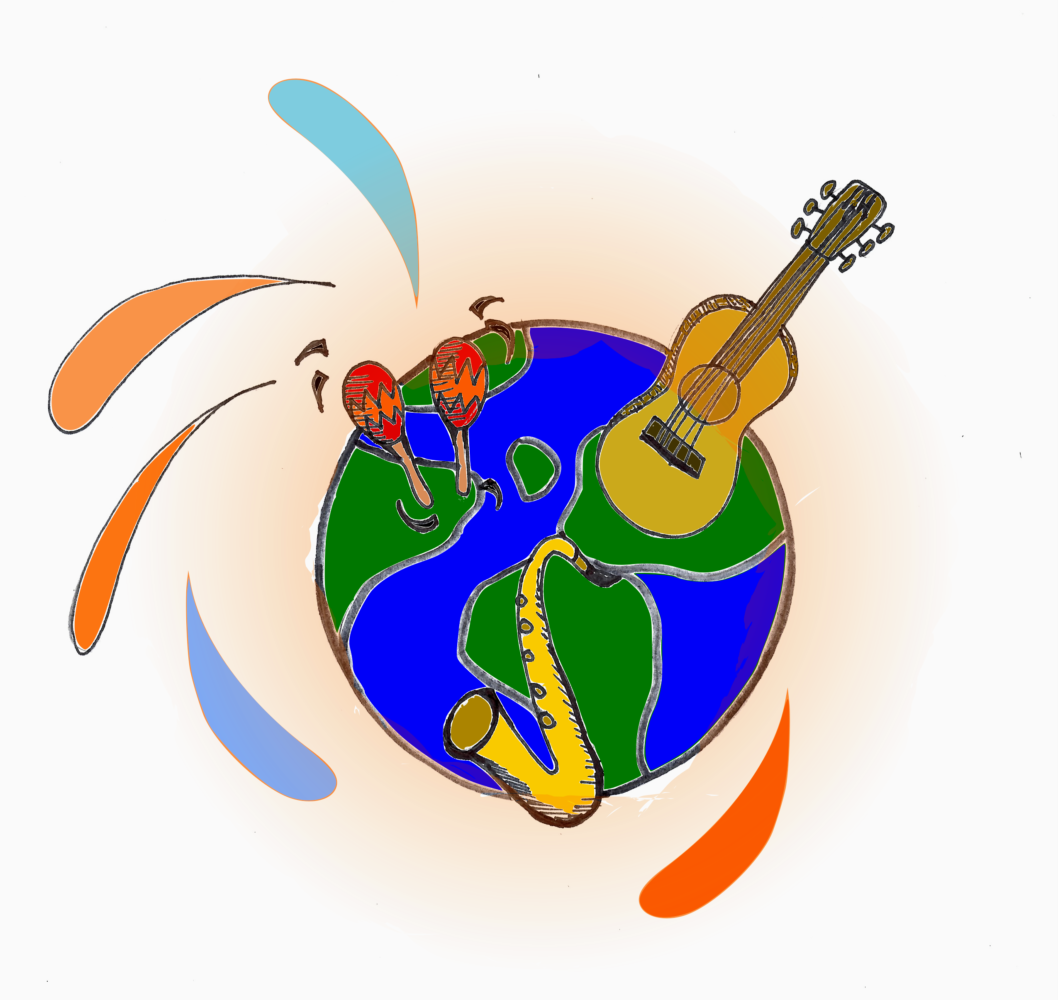When the whole world collides: global music hits the charts


(Illustration by Abby Katz | Staff Illustrator)
If you turned on your car radio during the summer of 2016, chances are you came under the influence of the tropical pulse of Drake’s “One Dance.”
As the first song to hit one billion plays on Spotify, it marked one of the 2010s’ biggest music stars hitting a viral peak. But it wasn’t just Drake’s magical touch that made the song a success — sweeping samples of UK funk, Jamaican dancehall and featured Nigerian afrobeats artist Wizkid are what made it truly important.
With “One Dance” and songs like it consistently at the top of the charts, it’s clear dance is the universal language that defines popular music in 2017 — and this integration is the product of music streaming, social media and a world more connected than ever before.
After “One Dance” gave up its number one spot, other songs with global sounds took its place. Well-known pop artist Justin Bieber appeared on a remix of Puerto Rican artist Luis Fonzi’s song, “Despacito,” which led the US Billboard 100 for 16 straight weeks, despite being sung mostly in Spanish. This ties Mariah Carey and Boyz II Men’s “One Sweet Day” for the longest run ever.
And like Drake, Fonzi drew from global sounds for his hit single. “Despacito” is rooted in reggaeton, a form of Latin music born in Puerto Rico that takes roots in hip-hop, reggae and dancehall. And it is all over the US charts. A Beyonce remix of J. Balvin’s “Mi Gente” joined “Despacito” as the second mostly-not-English song on the October Billboard Top 10 — a feat never seen before. Balvin’s catalogue is dense with songs that can have major global appeal, such as the winding and gyrating “Safari,” which features American singer and producer Pharrell.
But this international flavor is nothing new — over the past decade pop, hip-hop, dance and other urban music have long acknowledged their multicultural roots.
Electronic music trio Major Lazer regularly captures global textures like dancehall, Brazilian baile-funk and Latin sounds, and has since its inception in 2009 — and the group’s multicultural roots are always at the root. In fact, regarding the music video for the tropical, syncopated smash-single “Lean On” shot in India, the band said the choice was representative of the cultural mashup the group has always been.
This international influence isn’t just limited to ambitious electronic groups or producers — and it seems like music sometimes falls flat without it.
Currently, cold, noir trap music dominates mainstream U.S. hip-hop. An emergence of artists such Lil Yachty and Lil Uzi created a popular subgenre dubbed “mumble rap,” a sort of punk-rap movement, where the traditional rules and lyricism of hip-hop are exchanged for rawness, quantity of output and virality. It may be a valid form of expression, but it lacks longevity or broad appeal.
Take for example Desiigner’s “Panda,” one of the genre’s best charting singles to date. The song reached No. 1 after 41 weeks of foreign artist domination — and after just two weeks, “One Dance” stole the spot. Trap and mumble rap are fun to listen to on a Friday night, but without engaging with global roots they simply don’t earn longevity.
There’s one genre that bridges this gap — the recently flourishing afrobeats, which combines African pop, dancehall, hip-hop and a UK strain of punk called grime. The result is a compelling stark contrast that even artists like Kanye West are fascinated by.
And it seems like the global influence changes more than just the sound. In afrobeats, there is a welcome sense of respect for the women that U.S. hip-hop notoriously lacks. In afrobeats, a fascination with movement replaces money and strippers. The songs might seem simple, but they focus on rhythm and music’s connection to dance. The music videos often feature a diversity of women in forms and appearance that doesn’t manifest itself in the same way as in commercial hip-hop.
But maybe trap or hip-hop and afrobeats aren’t quite as different as they seem. Hip-hop originated as the voice of the unheard and misrepresented — specifically black, urban youth. Afrobeats is the reactionary voice of a misrepresented continent shedding preconceived notions of what it means to be African, so similarities naturally arise from struggles. Regardless, the widespread appeal of globally integrated music like afrobeats compared to the short-lived viral fame of trap shows audiences today demand more diverse, thoughtful music.
The success of global music across genres shows that young people desire to feel more connected to other parts of the world in a way we’ve never seen before. Without the viral forces of music streaming and social media, many of these collaborations simply wouldn’t be possible.
And whether you like global influence or not, music is way to escape sometimes horrible realities — when put into a global perspective, infectious rhythm and sound serve as great ways to break down our cultural divides.
But more than anything, the result is some really great music.
Levko primarily writes about environmental issues, cultural topics and alternative lifestyles. Write to Levko at ldk14@pitt.edu.
Recent Posts
Review | Delayed checkouts at ‘The White Lotus’: An unoriginal third season
(Contains Spoilers) There is no meditation class, no reiki session, no nutritionally balanced, organic food…
Celebrating Women’s History Month with the HerStory Slam Event
Idaya Sasikumar, a first-year psychology student, took to the stage to read her personal story.…
Review | Michael Franti & Spearhead reflect on the power of love in new album ‘Welcome to the Family’
Nothing says “Welcome to the family!” like a new baby. Soul-rock band Michael Franti &…
How hurling put me on ESPN and in a National Championship game
Nothing is more difficult than joining a new club in college. It is terrifying when…
Column | It’s now or never for Henry Davis
When Henry Davis came into Monday night’s game against the Washington Nationals at PNC Park,…
Pitt men’s basketball navigating transfer portal difficulties
Pitt men’s basketball is like any other team in the world of large NIL deals…
